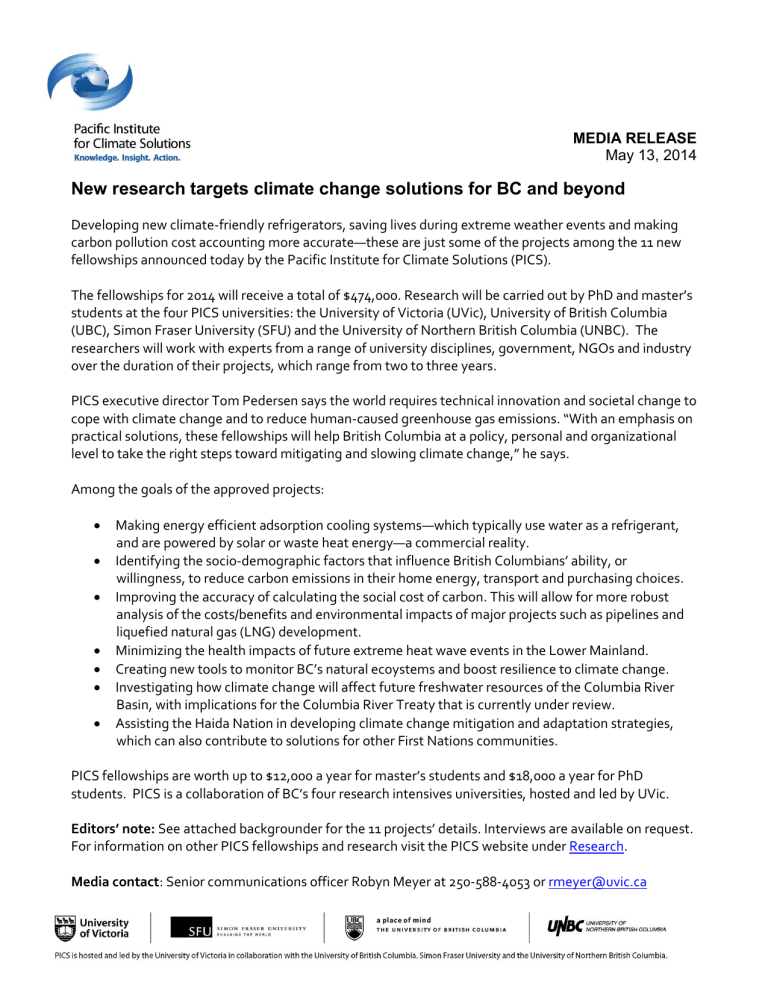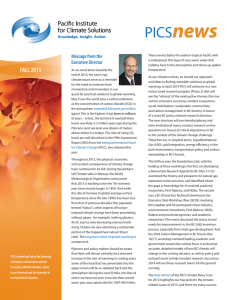New research targets climate change solutions for BC and beyond

MEDIA RELEASE
May 13, 2014
New research targets climate change solutions for BC and beyond
Developing new climate-friendly refrigerators, saving lives during extreme weather events and making carbon pollution cost accounting more accurate—these are just some of the projects among the 11 new fellowships announced today by the Pacific Institute for Climate Solutions (PICS).
The fellowships for 2014 will receive a total of $474,000. Research will be carried out by PhD and master’s students at the four PICS universities: the University of Victoria (UVic), University of British Columbia
(UBC), Simon Fraser University (SFU) and the University of Northern British Columbia (UNBC). The researchers will work with experts from a range of university disciplines, government, NGOs and industry over the duration of their projects, which range from two to three years.
PICS executive director Tom Pedersen says the world requires technical innovation and societal change to cope with climate change and to reduce human-caused greenhouse gas emissions. “With an emphasis on practical solutions, these fellowships will help British Columbia at a policy, personal and organizational level to take the right steps toward mitigating and slowing climate change,” he says.
Among the goals of the approved projects:
Making energy efficient adsorption cooling systems—which typically use water as a refrigerant, and are powered by solar or waste heat energy—a commercial reality.
Identifying the socio-demographic factors that influence British Columbians’ ability, or willingness, to reduce carbon emissions in their home energy, transport and purchasing choices.
Improving the accuracy of calculating the social cost of carbon. This will allow for more robust analysis of the costs/benefits and environmental impacts of major projects such as pipelines and liquefied natural gas (LNG) development.
Minimizing the health impacts of future extreme heat wave events in the Lower Mainland.
Creating new tools to monitor BC’s natural ecoystems and boost resilience to climate change.
Investigating how climate change will affect future freshwater resources of the Columbia River
Basin, with implications for the Columbia River Treaty that is currently under review.
Assisting the Haida Nation in developing climate change mitigation and adaptation strategies, which can also contribute to solutions for other First Nations communities.
PICS fellowships are worth up to $12,000 a year for master’s students and $18,000 a year for PhD students. PICS is a collaboration of BC’s four research intensives universities, hosted and led by UVic.
Editors’ note: See attached backgrounder for the 11 projects’ details. Interviews are available on request.
For information on other PICS fellowships and research visit the PICS website under Research .
Media contact : Senior communications officer Robyn Meyer at 250-588-4053 or rmeyer@uvic.ca
PICS FELLOWSHIPS 2014 – Backgrounder
Development of advanced composite materials for adsorption cooling systems
Refrigeration and air conditioning systems worldwide consume a significant amount of electricity and contribute to global warming. Although less harmful than their ozone-depleting chlorofluorocarbon
(CFC) predecessor, commonly used vapour compression refrigerants such as hydrofluorocarbons (HFC’s) are greenhouse gases (GHGs) as well as big energy users. This project supports the creation of a new generation of energy-efficient adsorption cooling systems that typically use water as a refrigerant, and are powered by solar energy or waste heat. By testing new materials and prototypes, researchers hope to increase the commercial uptake of this sustainable technology by creating more compact systems with greater cooling powers.
Project proponent: Dr. Majid Bahrami, Mechatronic Systems Engineering, Simon Fraser University (SFU)
Project collaborators: SFU’s Laboratory of Alternative Energy Conversion, 4DLabs and Dept. of Chemistry
Discovering British Columbians’ psychological barriers to climate-positive behaviour
Polls consistently show there is high public concern over climate change, yet many people continue to engage in climate-harmful behaviours in their transportation, energy, food, and purchasing decisions.
This study focuses on the barriers British Columbians face in adopting climate-positive behaviours, and will be a crucial “diagnostic” step in identifying the socio-demographic factors that influence peoples’ ability or willingness to reduce carbon emissions. The variables to be examined include region of BC, household size, income, age, educational level, political party preference and gender. Rejecting a “onesize-fits-all” approach, this information will be used to better tailor climate policy to different segments of the BC population, and increase the uptake of climate-positive actions.
Project proponent: Prof. Robert Gifford, Dept. of Psychology and School of Environmental Studies, UVic.
Project collaborators: School of Environmental Studies, polling company
Planning for climate-induced changes to the Columbia Basin’s freshwater resources
This project will study climatically induced hydrologic changes within the Columbia River Basin and develop reliable projections of 21 st
-century glacier and snowmelt runoffs. Together, these will yield valuable information for the Columbia River Treaty, currently under review. September 16, 2014, marks the earliest date when either the Canada or US government can provide notice to terminate the 50-yearold agreement that governs this critical international watershed. By providing Columbian Basin stakeholders with accurate data on freshwater resources under a changing climate, this project will assist the renegotiation process and decisions related to adaptation, hydroelectric power generation, flood management and water supply issues in BC and the Pacific northwest US.
Project proponent: Dr. Brian Menounos, Geography, University of Northern British Columbia (UNBC)
Project collaborators: Columbia Basin Trust, Pacific Climate Impacts Consortium, Parks Canada, Natural
Resources Canada, BC Hydro, other PICS universities
Maximizing the contribution of BC’s eelgrass ecosystems to climate change solutions
Coastal seagrass ecosystems provide shoreline stabilization, nursery habitat for fish and invertebrates, and can sequester and store more carbon than tropical forests. Yet little is known about BC’s seagrass ecosystems, with much of the native eelgrass ( Zostera marina ) already lost. The remainder sits on three per cent of the province’s coastline and is being threatened by shoreline development, pollution and invasive species. This project will use sediment cores from eelgrass meadows to quantify the plant’s carbon storage capacity; conduct biodiversity surveys, including sampling resident commercially important salmon and rockfish species; and test how different climate change scenarios affect seagrass ecosystems, using conservation planning mapping software. Knowing the optimal conditions for eelgrass carbon sequestration and storage will also assist with restoration efforts, and help minimize trade-offs with other climate change solutions, such as retaining walls to prevent impacts of sea level rise.
Project proponent: Dr. Julia K. Baum, Dept. of Biology, UVic
Project collaborators: Sea Change Marine Conservation Society, Galiano Conservancy Association and potentially, Environment Canada, Fisheries and Oceans Canada, CWS, Parks Canada, and the Capital
Regional District
The social cost of carbon and Canadian climate policy
This project will provide a refined and more accurate calculation of the social cost of carbon (SCC), which is a key economic measure for estimating the marginal cost of damage from climate change. It is particularly germane given Canada’s stated 2020 greenhouse gas reduction targets: a 17 per cent reduction from 2005 levels. Using the world-leading models and the most up-to-date scientific/economic research, including estimates of the cost of non-market damages, the results will be compared to current
SCC estimates. An improved SCC will allow for more robust benefit-cost analyses and environmental impact assessments of new infrastructure and development projects in BC and throughout Canada, such as building liquefied natural gas (LNG) plants or additional pipelines. The research will be of value to economists, policymakers, and politicians as the climate system warms and the associated economic, social, and environmental costs to Canadians become significant.
Project proponent: Prof. Mark Jaccard, School of Resource & Environmental Management, SFU
Project collaboration: Project incorporates scientific research from the areas of climatology, ecology, and economics, among others.
Educating/mobilizing communities in a changing climate: Initiating action on Haida Gwaii
This project will draw on the traditions and culture of the Haida Nation in developing climate change mitigation and adaptation strategies for those living on Haida Gwaii, off BC’s north coast, as well as contribute to solutions for other First Nations communities. This work will also develop specific steps toward achieving resolutions set by the Haida’s governing body, the Council of the Haida Nation (CHN), in areas such as financial support, and will identify available technologies or alternative energy sources to the mainstay, diesel. First Nations communities face unique challenges to their culture and way of life from climate change, and this study will help better represent their interests. The research will be carried out by a respected scholar and elder from Haida Gwaii, and will engage a broad range of stakeholders
including educators, business leaders, youth, and the CHN.
Project proponent: Dr. David Bryan Zandvliet, Institute for Environmental Learning, Faculty of Education,
SFU
Project collaborators: Council of the Haida Nation, and other researchers
Surface temperature heat-mapping in the Lower Mainland
This project will create a high-resolution heat map of the Lower Mainland that will help minimize the health effects of future extreme hot weather events, which are expected to occur more frequently as the climate changes. In 2009, 110 excess deaths (over usual mortality rates) occurred in the region over a oneweek period during a heat wave, and since then the BC Centre for Disease Control (BCCDC) has developed a heat map using remote sensing measurements from the satellite Landsat. This research will improve this map by supplying on-the-ground temperature readings during summer 2014 that will better pinpoint heat variability within urban settings. To identify areas of highest risk, the map will be overlain with other spatial information about population density, socio-economic factors, and past mortality.
Having such detailed micro-environmental information will help identify areas where cooling strategies need to be focused as part of adaptation planning. Such strategies can include adding street trees and public fountains.
Project proponent: Prof. Michael Brauer, School of Population and Public Health, UBC
Project collaborators: Lower Mainland health authorities, the BCCDC, emergency response co-ordinators, and urban planners, as well as UBC-SFU faculty
The potential of agricultural waste-to-energy systems for reducing GHG emissions and improving air quality in BC
Livestock farms in BC generate 2.7 million tonnes of manure each year, resulting in waste odors and GHG emissions, as well as contamination of soil and waterways. But if that manure is converted to renewable biogas (via an anaerobic digester) it can replace natural gas for heating greenhouses while providing byproduct carbon dioxide (CO
2
) to promote plant growth. The leftover residue from the digester can be used as a valuable bio-fertilizer. Initial work by this research team has found that an integrated ecoindustrial system can reduce non-renewable energy consumption, GHG emissions, and human health impacts by more than 40 per cent compared to conventional operations. This expanded study will bring mushroom houses into the mix, as both additional sources of CO
2 and recipients of biofertilizer. It will examine the economic, environmental and policy implications—and feasibility—of a dairy farmgreenhouse-mushroom house eco-industrial system, and the resultant reduction in fossil fuel use, GHG emissions and improvements to air quality and health, especially in the Lower Mainland and Fraser
Valley.
Project proponent: Prof. Xiaotao Tony Bi, Clean Energy Research Centre and Department of Chemical and
Biological Engineering, University of British Columbia (UBC)
Project collaborators: Centre for Environmental Strategies at the University of Surrey, UK
Post-disaster land use changes as a climate adaptation strategy
Flood management in BC has largely been reactive, but this project aims to reduce the recurrence of damaging floods by supporting post-disaster land use change policies and planning. Climate change brings sea-level rise and an increased likelihood of extreme weather, elevating flood risks. History shows that communities are often more willing to retreat from developed at-risk areas after a disaster than before, but such efforts do not always succeed. By studying 100 communities that have been affected by flood disasters within the past decade in Canada, the US, Australia and other countries, this project will examine what has worked, and what hasn’t, for mitigating flood risk through land use planning. Factors to be studied will include flood insurance, structure of disaster assistance programs, population, size of disaster, and coastal versus riverine hazard.
Project proponent: Prof. Stephanie Chang, School of Community & Regional Planning, and Institute for
Resources, Environment & Sustainability, UBC
Project collaborators: UBC faculty from different disciplines
Ecosystem resilience and changing climate: detecting catastrophic change before it happens
Catastrophic change in ecosystems caused by climate change is poorly understood and there are few tools to predict its arrival, as was the case with BC’s mountain pine beetle outbreak. This project aims to develop cost-effective tools for measuring populations and communities of species and therefore anticipate and avoid abrupt changes. By creating drought conditions in test areas, this study will examine the population fluctuations and overall function of two well-established moisture-rich ecosystems— moss-microarthropods on southeastern Vancouver Island, and bog forest systems on BC’s central coast.
Research will occur at the microcosm (lab), field and landscape level. Having a greater understanding of the patterns that precede sudden ecosystem change will assist managers in boosting overall ecosystem resilience.
Project proponent: Dr. Brian Starzomski, School of Environmental Studies, UVic
Project collaborators: biologists, archaeologists, paleo-ecologists, geographers, climatologists, First Nations and ethno-ecologists
Mapping and managing heat-related vulnerability and mortality in BC: A GVRD case study
This project will develop an urban heat vulnerability index to help BC municipalities and health authorities better prepare and adapt to the increased frequency, severity and duration of extreme heat events experienced as a result of climate change. The research will focus on the Greater Vancouver Regional
District (GVRD) but will be applicable to other coastal cities in BC. Using satellite images and local weather station readings to map temperatures during extreme heat events, the project will combine temperature maps with building, socio-economic and demographic information as well as data on heatrelated health problems. Expected project outcomes include enhanced heat emergency management, the development of heat-focused protocols for urban planning, reduced heat-related morbidity and mortality, prevention of large-scale climate sensitive diseases and improved building design to reduce climate change impacts.
Project proponent: Anders Knudby, Dept. of Geography, SFU
Project collaborators: UBC, City of Vancouver, BC Centre for Disease Control, plus urban planning and public health authorities





